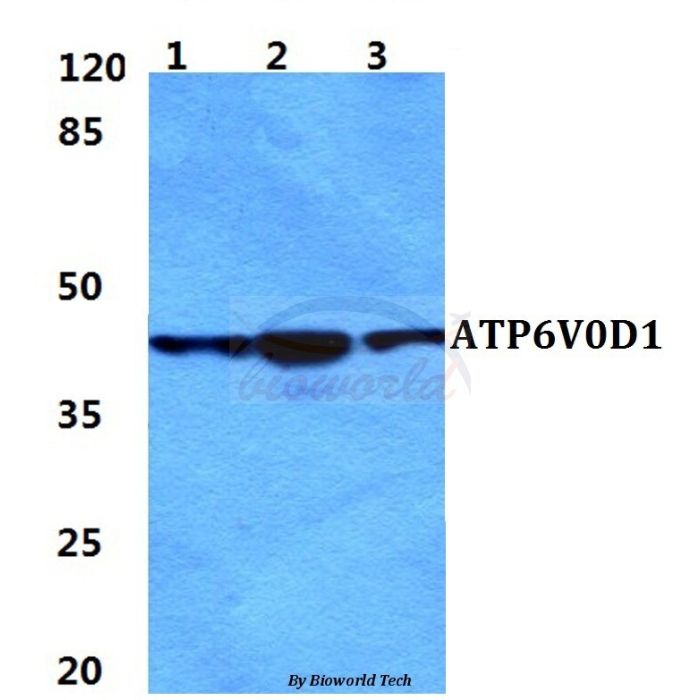ATP6V0D1 polyclonal, anti-human, mouse, rat
€305.00
In stock
SKU
BS5977
Background:
Vacuolar-type H+-ATPase (V-ATPase) is a multisubunit enzyme responsible for the acidification of eukaryotic intracellular organelles. V-ATPases pump protons against an electrochemical gradient, while F-ATPases reverse the process, thereby synthesizing ATP. A peripheral V1 domain, which is responsible for ATP hydrolysis, and an integral V0 domain, which is responsible for proton translocation, comprise the V-ATPase complex. Nine subunits (A–H) make up the V1 domain and five subunits (A, D, C, C' and C") make up the V0 domain. V-ATPase D1 (ATPase, H+ transporting, lysosomal, V0 subunit D1), also known as ATP6V0D1, P39, VATX, VMA6, ATP6D or VPATPD, is the D subunit of the V0 domain. Expressed ubiquitously, V-ATPase D1 acts in concert with other V0 subunits to catalytically acidify a variety of intracellular compartments, thereby synthesizing ATP to be used for vacuolar transport.
Alternative Name:
V-type proton ATPase subunit d 1, V-ATPase subunit d 1, 32 kDa accessory protein, V-ATPase 40 kDa accessory protein, V-ATPase AC39 subunit, Short name=p39, Vacuolar proton pump subunit d 1, ATP6V0D1, ATP6D, VPATPD, V-ATPase D1
Application Dilution: WB: 1:500~1:1000
Specificity: ATP6V0D1 polyclonal antibody detects endogenous levels of ATP6V0D1 protein.
Immunogen:
Synthetic peptide, corresponding to amino acids 280-325 of Human ATP6V0D1.
MW: ~ 40 kDa
Swis Prot.: P61421
Purification & Purity:
The antibody was affinity-purified from rabbit antiserum by affinity-chromatography using epitope-specific immunogen and the purity is > 95% (by SDS-PAGE).
Format:
1 mg/ml in Phosphate buffered saline (PBS) with 0.05% sodium azide, approx. pH 7.2.
Storage:
Store at 4°C short term. Aliquot and store at -20°C long term. Avoid freeze-thaw cycles.
For research use only, not for use in diagnostic procedure.
Vacuolar-type H+-ATPase (V-ATPase) is a multisubunit enzyme responsible for the acidification of eukaryotic intracellular organelles. V-ATPases pump protons against an electrochemical gradient, while F-ATPases reverse the process, thereby synthesizing ATP. A peripheral V1 domain, which is responsible for ATP hydrolysis, and an integral V0 domain, which is responsible for proton translocation, comprise the V-ATPase complex. Nine subunits (A–H) make up the V1 domain and five subunits (A, D, C, C' and C") make up the V0 domain. V-ATPase D1 (ATPase, H+ transporting, lysosomal, V0 subunit D1), also known as ATP6V0D1, P39, VATX, VMA6, ATP6D or VPATPD, is the D subunit of the V0 domain. Expressed ubiquitously, V-ATPase D1 acts in concert with other V0 subunits to catalytically acidify a variety of intracellular compartments, thereby synthesizing ATP to be used for vacuolar transport.
Alternative Name:
V-type proton ATPase subunit d 1, V-ATPase subunit d 1, 32 kDa accessory protein, V-ATPase 40 kDa accessory protein, V-ATPase AC39 subunit, Short name=p39, Vacuolar proton pump subunit d 1, ATP6V0D1, ATP6D, VPATPD, V-ATPase D1
Application Dilution: WB: 1:500~1:1000
Specificity: ATP6V0D1 polyclonal antibody detects endogenous levels of ATP6V0D1 protein.
Immunogen:
Synthetic peptide, corresponding to amino acids 280-325 of Human ATP6V0D1.
MW: ~ 40 kDa
Swis Prot.: P61421
Purification & Purity:
The antibody was affinity-purified from rabbit antiserum by affinity-chromatography using epitope-specific immunogen and the purity is > 95% (by SDS-PAGE).
Format:
1 mg/ml in Phosphate buffered saline (PBS) with 0.05% sodium azide, approx. pH 7.2.
Storage:
Store at 4°C short term. Aliquot and store at -20°C long term. Avoid freeze-thaw cycles.
For research use only, not for use in diagnostic procedure.
| Is Featured? | No |
|---|
Write Your Own Review

